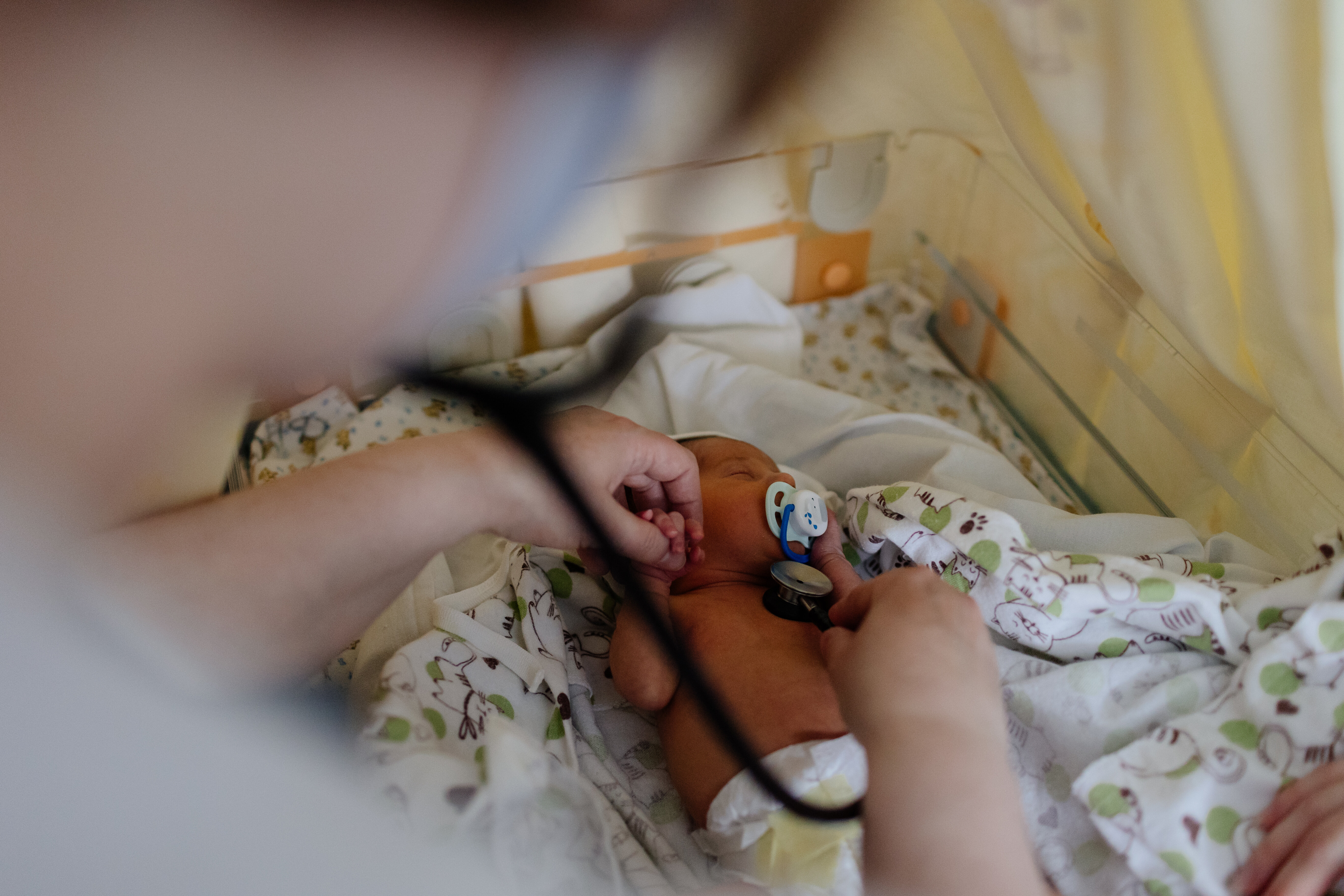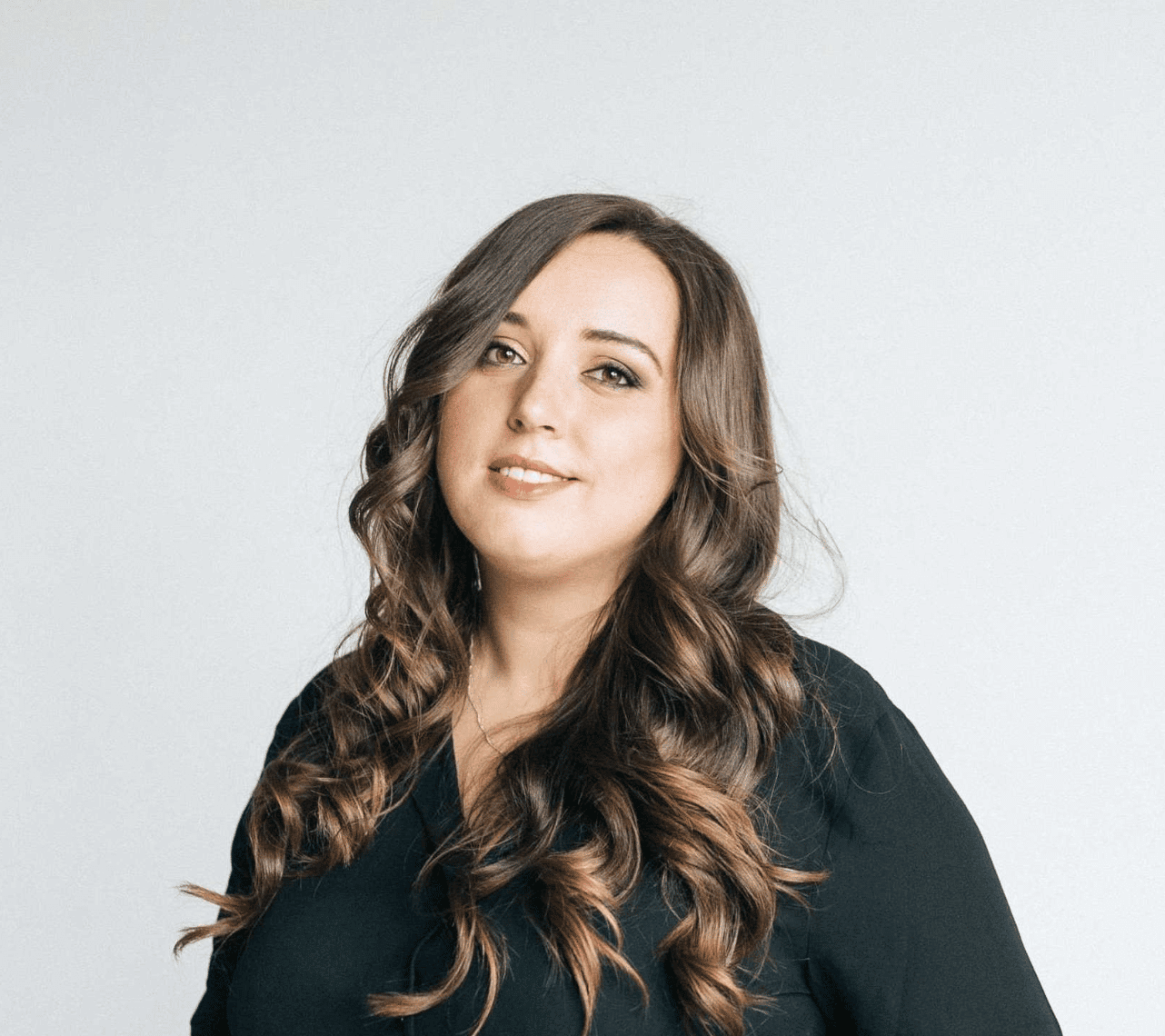![]()
It is a considerable challenge to be a child in times of war. Together with their parents these children move abroad, some of them are subjected to filtration camps, while others are forcibly relocated to Russia and ‚adopted‘ there. Most of these children have gone through trauma and, possibly, physical pain. According to official statistical data, as of October 2022, 428 Ukrainian children were killed with 815 wounded due to the Russian full-scale aggression.
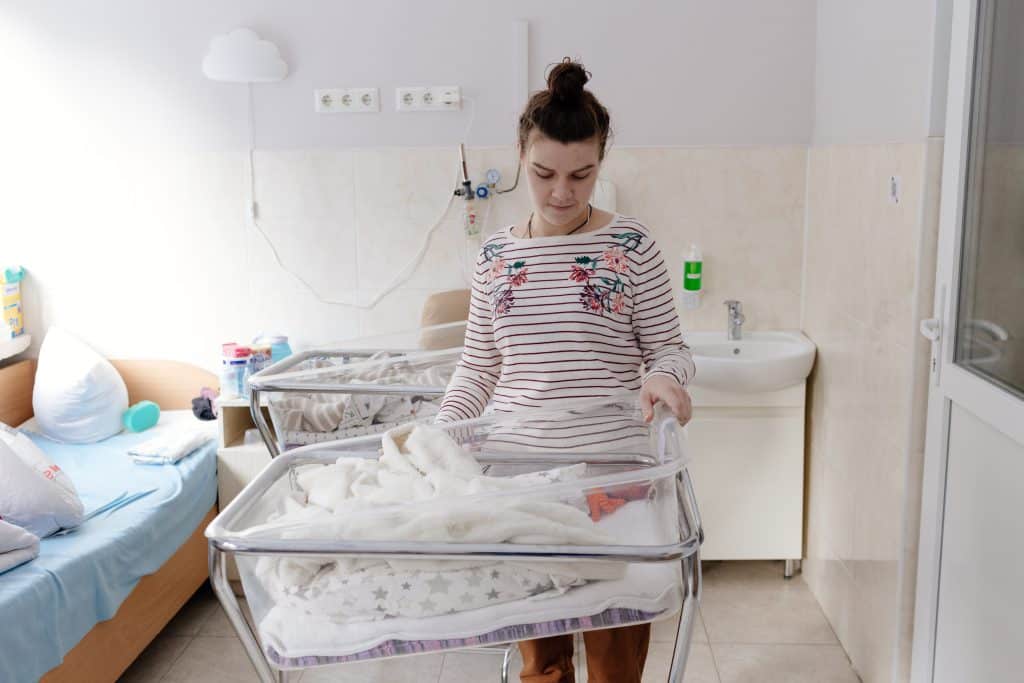
To give birth and to be born in times of war is no mean feat. All the more so for those who are prematurely born. During war would-be mothers run a higher risk of giving birth prematurely in view of stress and poor access to medical assistance. After ‚prematures‘ are born (the diminutive usually used to refer to the prematurely born), they require special conditions that are difficult to provide in the context of constant air raid sirens going off and power outages. However, many people in Ukraine are working to ensure that these children enjoy the best treatment possible.
Choosing life
As soon as explosions were heard in the outskirts of Mariupol on February 24, the 22-year-old Elya packed her things that she managed to squeeze into her car and drove off. She knew that she would probably never go back to the city where she and her husband had spent the previous 7 years. ‚We had our own home, but we had to leave it. We chose the lives of our children over it and left.’. Elya was in the fourth month of pregnancy. She was expecting two twin girls.

The road to Ivano-Frankivsk took her three days. ‚I was really worried since I thought that my state of shock and depression could have affected the girls‘, says Elya. She had been aware of the risk of giving premature birth since she made her first ultrasound test, when doctors spotted twins in her womb. For a fragile woman as she is it is quite challenging to carry a baby, let alone twins. Everyone was hoping that she would be able to carry the twin girls at least until the 36th week of her pregnancy, which is the cut-off date for prematurely born children.
Normally children are born from the 37th week onwards. Their normal weight would be no less than 5,5 lbs. Elya’s daughters, Maria and Polina, were born almost a month prematurely, in the 32nd week, weighing 4,7 and 3,6 lbs respectively. ‚Had I not endured stress, had my pregnancy gone smoothly, just like I imagined it would, on a sea coast with my husband and parents by my side, breathing fresh air, I would have given birth in the 36th week‘, says Elya. Her parents stayed in Donetsk. Elya’s husband serves in the military, which is why they live in different cities.
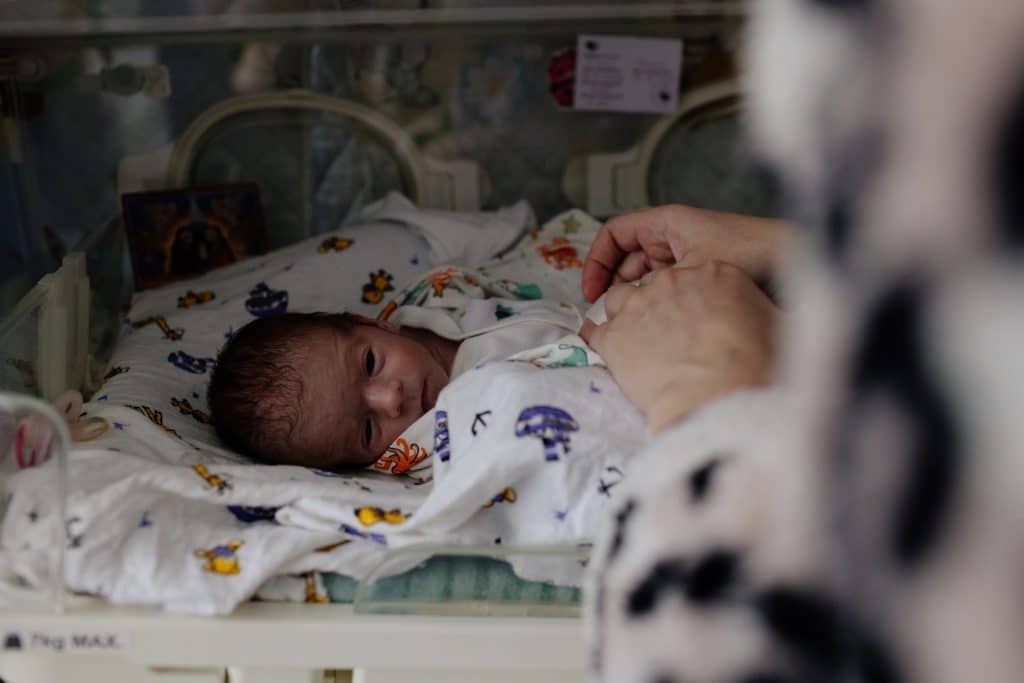
She spent two months (the time she needed for her pregnancy to go through a full circle) with her daughters at the central hospital in Ivano-Frankivsk. During this time they managed to recover from coronavirus, with girls having also recuperated from pneumonia. Her twins are now over 6 months old, they are developing well, making up for the time lost and coping with their heart disorder with which they were diagnosed at birth. Elya reminisces about the qualified assistance and mental support she and her daughters received at the hospital with gratitude. However, some of her memories are painful.
When air raid sirens went off, mothers of the newborns had to descend into the bomb shelter, while their babies were taken to a special armored ward.
‚It was quite stressful. I was really worried since I knew I couldn’t take my babies with me. I was praying for the air raid alarm to be canceled as soon as possible’.
No choice available
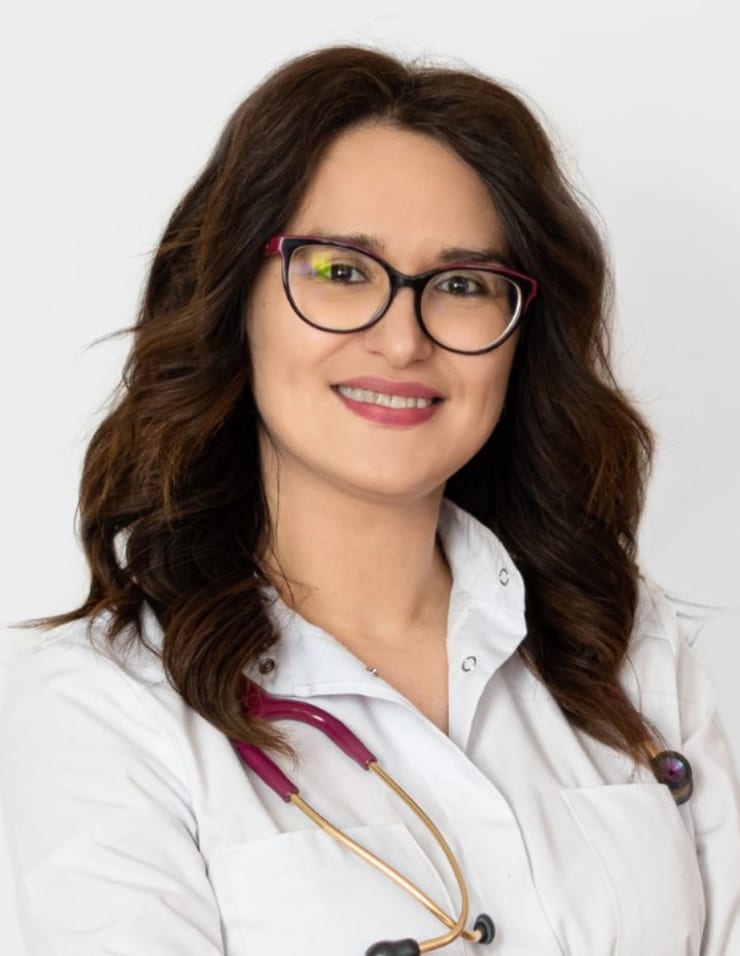
Olha Sadova
head of the intensive care unit for newborns at the Ivano-Frankivsk Oblast Perinatal Center
‘The staff of the maternity hospital are the first ones to take care of ‘prematures’. Right after they are born, babies are taken on a portable incubator to the intensive care unit where they are treated depending on their ailments they begin to develop in the first minutes of their life’, says Olha Sadova, head of the intensive care unit for newborns at the Ivano-Frankivsk Oblast Perinatal Center. She says that a prematurely born child runs a high risk of developing different diseases in view of immaturity of lots of their organs and systems’.
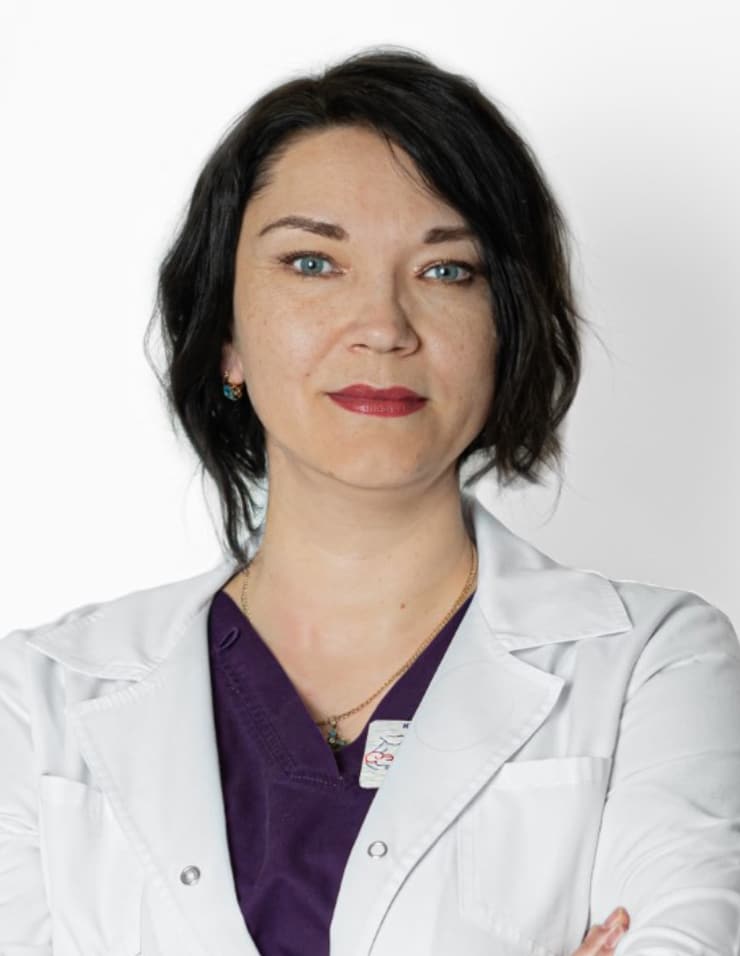
Olha Kirshak
Head of the neonatal and post-intense nursing of newborns at the Ivano-Frankivsk Oblast Perinatal Center
After their vital functions are stabilized, the next stage of nursing begins, which may last from several weeks to months. Olha Kirshak, head of the neonatal and post-intense nursing of newborns at the Ivano-Frankivsk Oblast Perinatal Center, says,
At this stage we continue treating the baby if needed, sustain their breathing, consulting with ophthalmologist, neurologist, therapist, geneticist and other experts.
Doctors assess the baby’s development and their readiness to eat. At each stage much attention is paid to pain, sound and light proofing. Parents are involved in the process of nursing their babies.
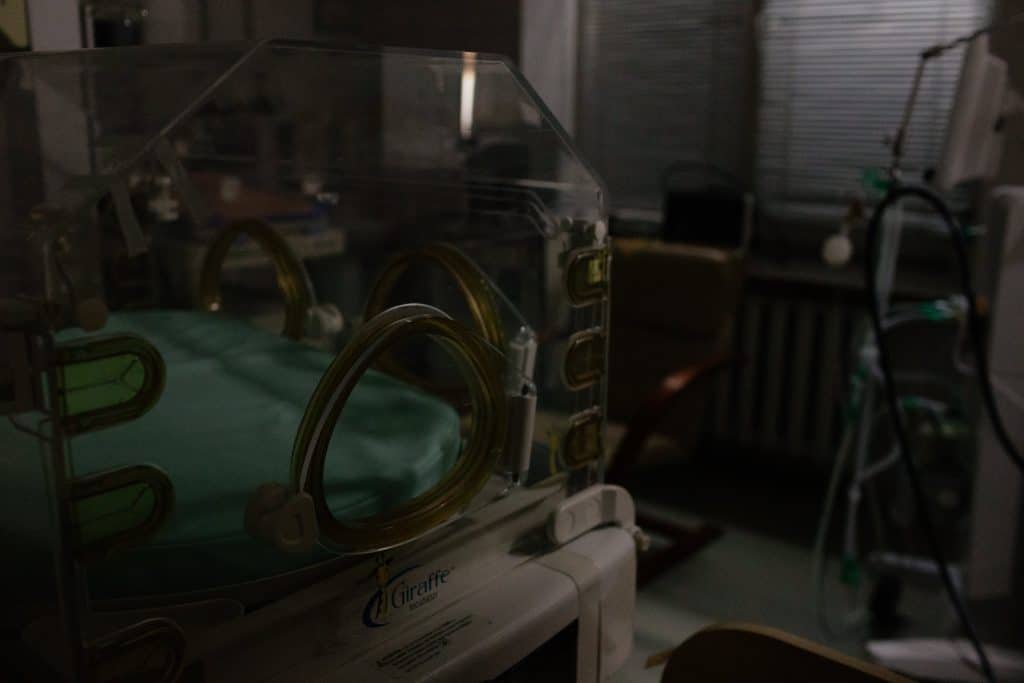
During the first days of their life ‚prematures’ are in need of warm and additional oxygen supplied to them through a mask. At times they may even require ventilation of the lungs. They are thus placed in special incubators where all necessary conditions are maintained. Thus, the newborns learn to regulate their body temperature and breathe. They get medicines through a drip, while their mothers’ milk and baby formula are supplied to them through a tube. All this imposes a heavy burden on the brain of a newborn. Until these children grow stronger, it is too risky to place them outside the incubator. It is effectively impossible to maintain such conditions in a bomb shelter. To take a newborn into one would spell inevitable death. The equipment that could potentially be transported into a bomb shelter would quickly break down due to voltage drops and constant blackouts.

Iryna Kondratova
Head of the Kharkiv Regional Perinatal Center
Head of the Kharkiv Regional Perinatal Center, Iryna Kondratova, has made it one of her priorities to upgrade equipment of the center and build up strategic reserves of medicines since the beginning of the Russian invasion. With a sad irony in her voice she says, ‚Only people are made of steel, equipment is fragile, though‘. Thanks to numerous projects and support from others her hospital has received generators, portable incubators, ventilators and a neonatal reanimobile and other important goods.
I was afraid I would run out of incubators or ventilators in view of these frequent visits to the bomb shelter, since the equipment here is quite delicate.
I was afraid I would run out of incubators or ventilators in view of these frequent visits to the bomb shelter, since the equipment here is quite delicate.
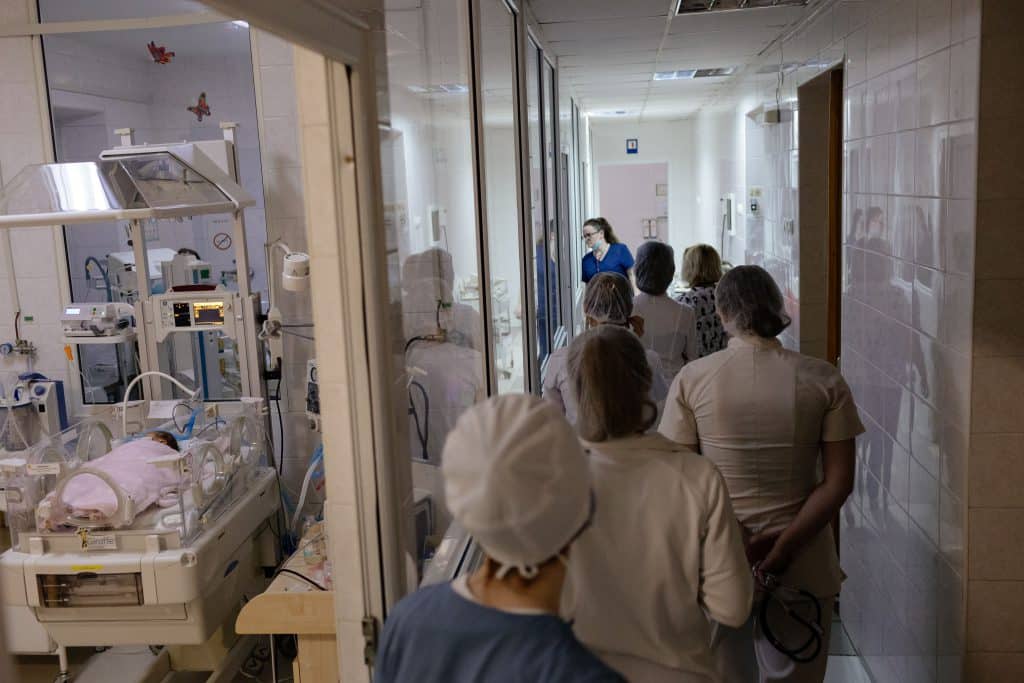
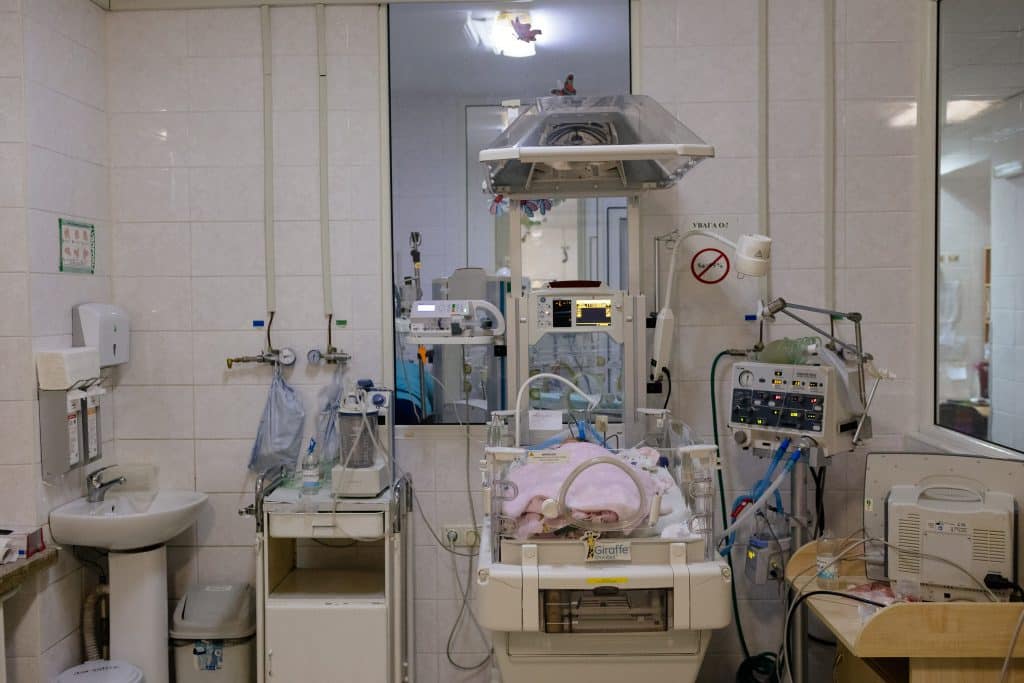
A few American fundraising platforms have been helpful, as well as UNICEF and its ambassador David Beckham. He granted Iryna access to his Instagram account (with 70 million of subscribers) for one day in March 2022 so that she could tell the world about how her hospital helped newborns and their parents in times of war.
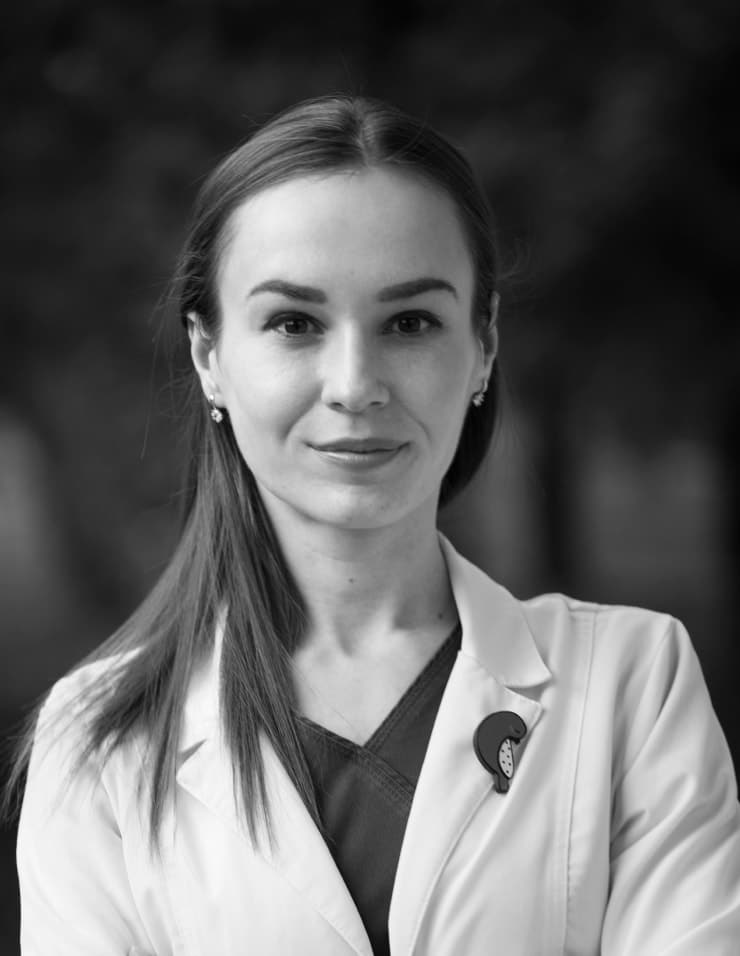
Anastasiya Stefanyshyn
Neonatologist from the Ivano-Frankivsk Oblast Children’s Hospital
Neonatologist from the Ivano-Frankivsk Oblast Children’s Hospital, Anastasiya Stefanyshyn, says,
When we were offered equipment at the beginning of the invasion, we declined the offer, saying that hospitals in Kharkiv were in greater need of it
, since she understood that the situation in this eastern city of Ukraine was far more critical. Anastasiya works in the intensive care and early rehabilitation department. Just like in the center of Iryna Kondratova’s, children in particularly difficult conditions are admitted to this hospital. If they are lucky, they will be discharged from hospital (relatively healthy) in a month. However, they may also have to stay there for 6 months. For example, a girl who was born in the 27th week had to spend 5 months at the hospital.
‚We have noticed a growing complexity of cases. Children develop more complications, they have to be kept longer at hospital‘, says Anastasia. ‚Not every woman was able to do normal perinatal testing during the war‘. The most common health issues among newborns are those with retina, nerve system and lungs. Considering the COVID-19 pandemic, they also often suffer from hematological and cardiological issues that manifest themselves in quite acute forms.
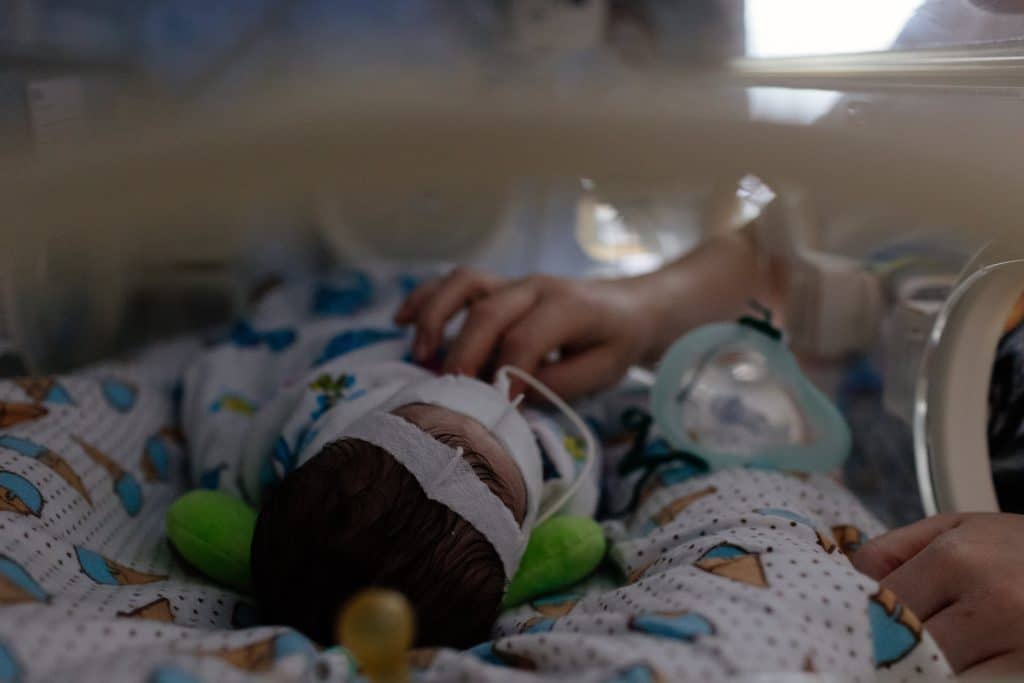
Iryna Kondratova has also spoken about the general problem of poor examination of would-be mothers. ‚There are lots of pregnant women from the de-occupied territories that have not had access to qualified medical aid for a long time, which is why they have infectious and other complications and exacerbation of chronic diseases: diabetes, epilepsy, hypertension. Almost all of these women suffer from deficiency anemia as their diet has been very poor. One of the patients spent three days at home, suffering from extremely high blood pressure, seized by an attack of cramps with her consciousness impaired. She could not get medical aid. Such cases have become more frequent.
Statistically shocking
In the world stress is considered one of the risk factors leading to premature births. Six months into the Russian full-scale invasion of Ukraine, the UN said that the stress caused by the war has contributed to the increase in premature births in Ukraine. Young parents, Anya and Taras, say that the strongest contractions ensued right after the air raid sirens went off at night. Doctors told them that night that they would have to be prepared for premature birth. They were right. Their baby weighed a mere 2,6 lbs.
In the first weeks after February 24, doctors observed an increase in the number of ‚prematures‘ in neonatal wards. In peacetime, the intensive care and early rehabilitation units of the Ivano-Frankivsk oblast children’s hospital were 60% full, from 14 to 16 patients were treated there at the same time. Since the beginning of the full-scale invasion the units have been full with patients. In the Kharkiv perinatal center premature births have made up 14-16% of all the births registered since the center has also been admitting pregnant women not only from Kharkiv, but also from Luhansk and Donetsk provinces. ‚The rate is high even for a tertiary perinatal center,‘ says Iryna Kondratova, drawing comparison between the current situation with that of eight years back. — ‚After a short spike in premature births in March-April 2022, the rate has now dropped by 8-10%. People have either adapted themselves to the new circumstances, or left the province or Ukraine altogether’.
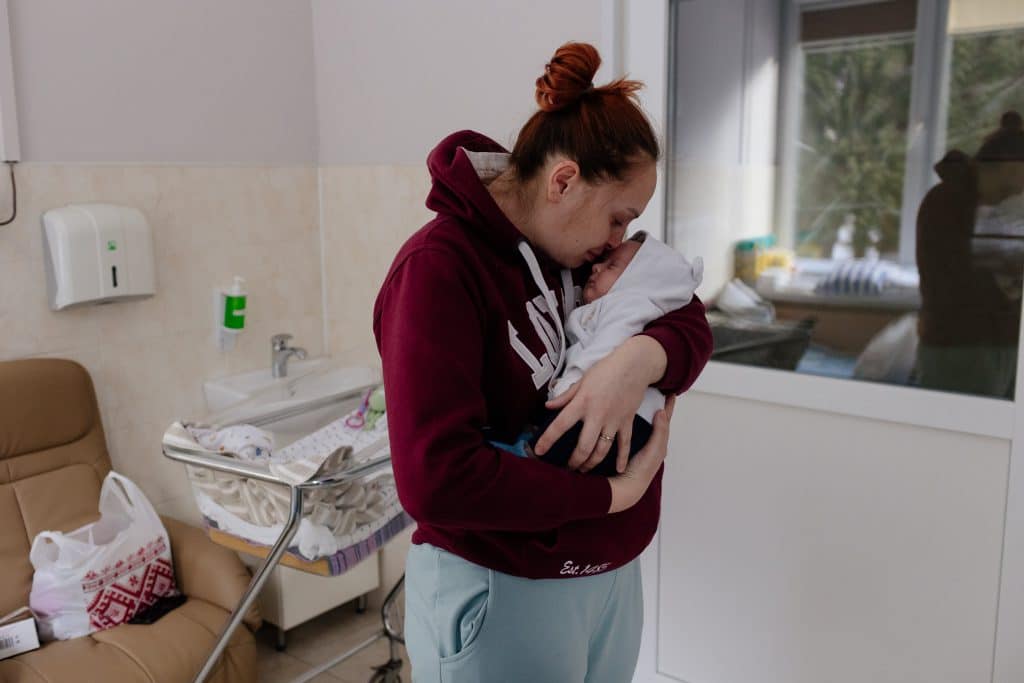
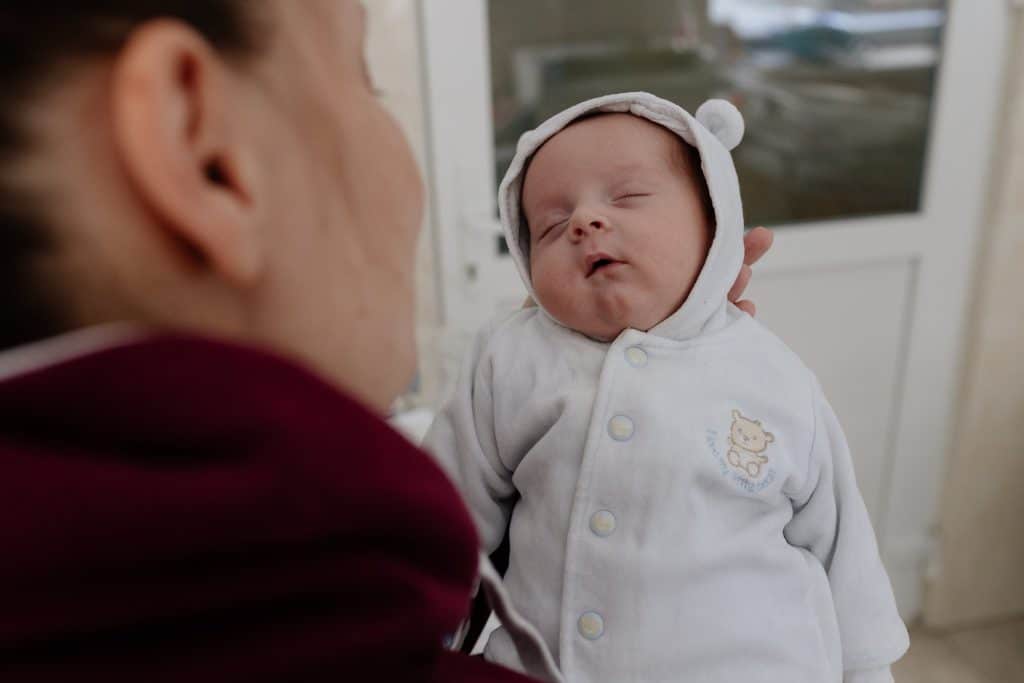
Doctors from other provinces have observed a twofold increase in the number of premature births, but the situation has stabilized with time and currently no spikes are being observed. Moreover, the birth rate has dwindled.
According to the statistical data provided by the State Expert Center of the Ministry of Healthcare of Ukraine, 152 thousand children were born in Ukraine during 9 months of 2022, 10 thousand of them weighed less than 5,5 lbs. In previous years both indicators were higher by 20-25%. The general proportion has been the same throughout the years, though. ‚Although there is no complete data on birth rates in Luhansk in 2022, Donetsk and Kherson province, we can already say with high precision that the rates have soared in western parts of Ukraine, as well as Kyiv and Dnipro‘, says Olha Vorobyova. It is to these regions that the pregnant women were relocating from hot spots and occupied territories of Ukraine. Nevertheless, hospitals in such cities as Kharkiv and Mykolayiv still admit pregnant women.
Tetyana Znamenska, president of the Association of neonatologists of Ukraine, professor and deputy head of the ‚The Lukyanova Institute for Pediatrics, Obstetrics and Gynecology of the National Academy of Sciences of Ukraine‘, has spotted an important tendency – the mortality rate among children under 1 year has not increased compared to previous years, standing at 6,72 per 1000 children. ‚This means that support provided for newborns in Ukraine continues to be high-qualified‘.
Women keep coming back to Ukraine to give birth here.
Anastasiya Stefanyshyn told us a story about a patient and her son who were about to be discharged on February 24. Her case was quite difficult, accompanied by many other diseases. They fled abroad to be treated in another country. However, a few months later they came back to Ukraine to give birth at home, since they felt more comfortable here and services were provided quicker. Another patient came deliberately back to Ukraine to give birth to her baby child who weighed 1,9 lbs.
‚Neonatology and maternal-fetal medicine had been second to none in Ukraine well before the Russian invasion. We have modern perinatal centers with intensive care units for newborns, which are equipped just like any other well-developed country. The government has always covered the needs of surfactants, caffeine, anti-D immunoglobulin and other drugs needed to stop bleeding during deliveries’, says Iryna Kondratova. ‚After February 24 nothing has really changed. We keep helping newborns, children with perinatal pathology using government-provided equipment, funds from donors and volunteer platforms’.
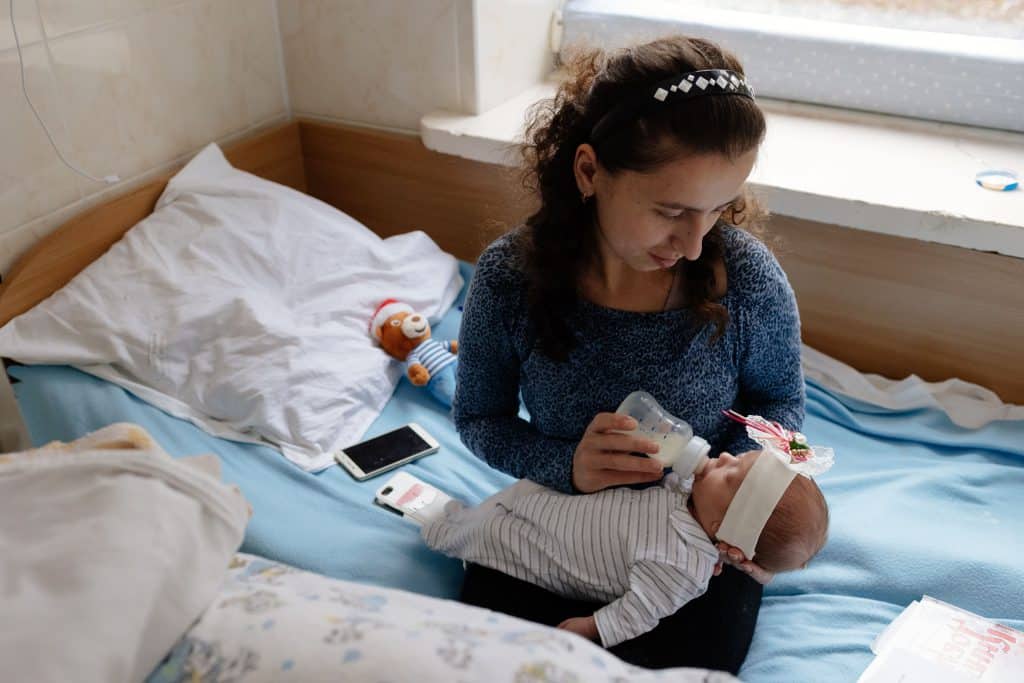
Helping doctors
‚We have been supported by our friends from Poland, France, and the USA. Also, families of our prematures, who were treated in our center and went abroad, are working as volunteers there and helping us‘, says the head of the Kharkiv regional perinatal center. We effectively experience no shortage of drugs or any other related products. The drugs that are not on the government list may not be purchased for the state money, so we have received them thanks to European volunteer projects’.
There is another item expenditure, namely, particular baby formula. At times a need for intravenous feeding arises. It is a paradox that very small children acutely need food since they have to catch up with their physical development and make up for the resources they will be losing. At the same time, doctors cannot give them a sufficient amount of food as independent eating places a severe strain on them. They require special solutions of fats and vitamins, hydrolyzed and amino acid formulas. The drug called Aminoven costs from about 8 to 15 USD a bottle. These drugs are both expensive and necessary at the same time.
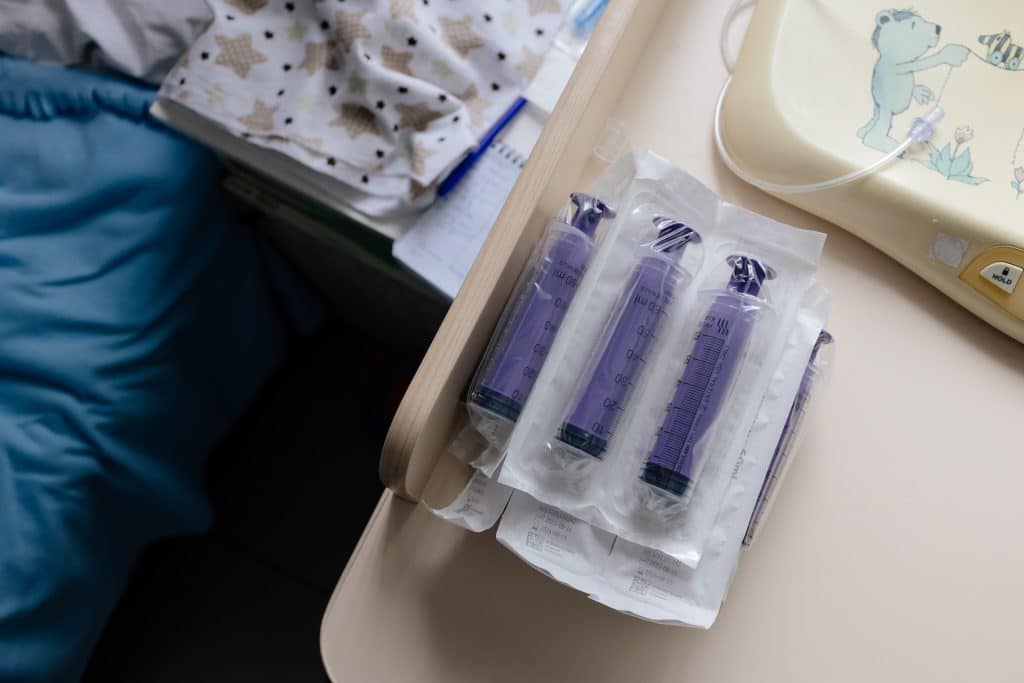
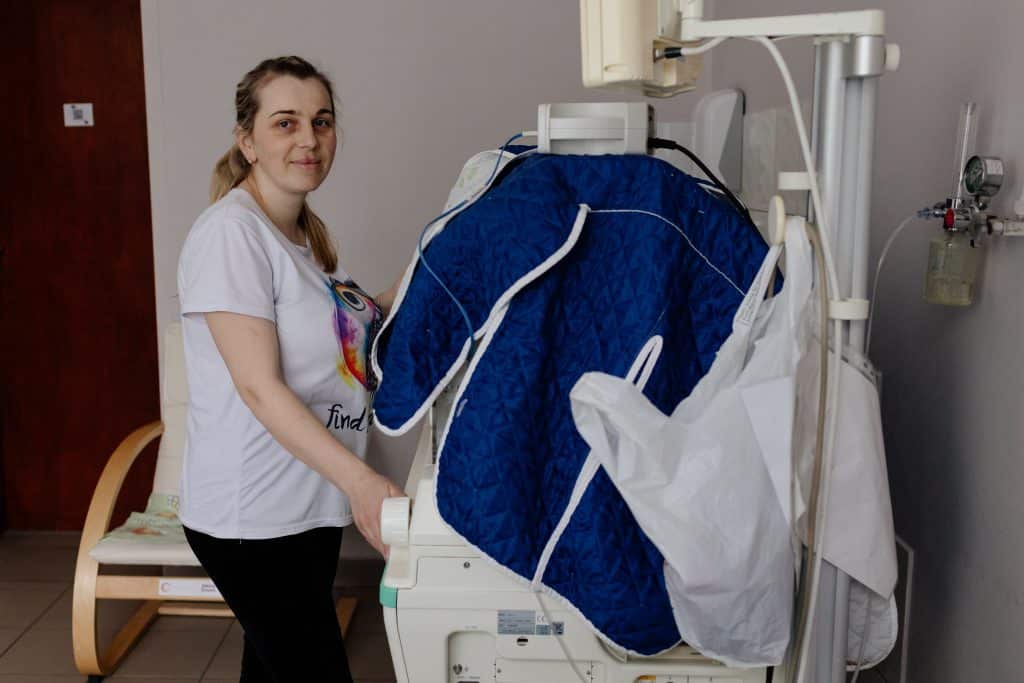
Medicines and consumables for one hospital alone mean millions of UAH. ‚Lots of people abroad understand that pregnant women and newborns are the most vulnerable group of society‘, says Anastasiya Stefanyshyn, the neonatologist from the Ivano-Frankivsk Oblast Children’s Hospital. ‚They are in need of help at the very start, since it is a question of whether you will live your life with disability or comfortably. That is why neonatal medicine and perinatal help are always in the focus of attention of people who want to help us. This has been a very fruitful year as we have something to work with, without having to be worried about whether we will run out of critical drugs’.
However, everyone understands that this is not going to last forever. Therefore, every opportunity needs to be seized (writing letters to fundraisers and donors even if you are a doctor and this is not your job). This surely requires time and energy, however, it does bring fruit and new contacts. For example, the intensive care and early rehabilitation department, where Anastasiya works, received mobile X-ray devices by sheer coincidence. ‚We were searching for a C-arch for the military hospitals where operations were performed. We were asked whether we needed an X-ray device for children. As a matter of fact, this was exactly something we were searching for at the time, since we could not transport newborns to the X-ray wards lest they lost their body heat’.
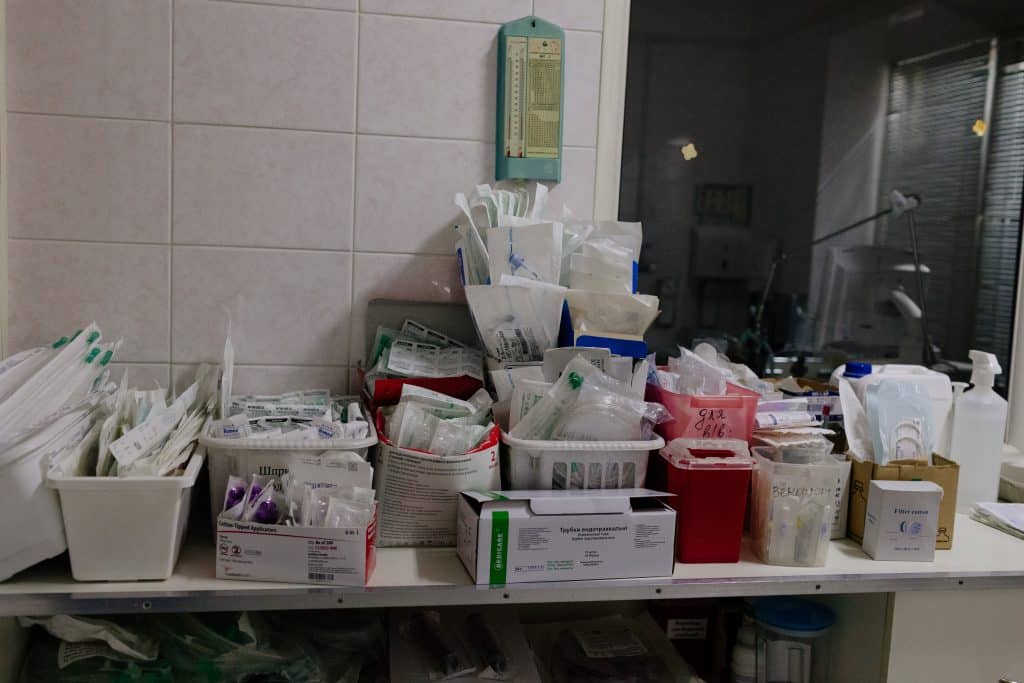
Currently, her unit is provided with main drugs, consumables and equipment. However, there is no knowing what will happen tomorrow. ‚The situation has improved compared to what it was. Critical gaps have been bridged, but not all of them. In the whole world the branch of medicine dealing with prematurely born children is the most expensive one’, says Anastasiya. According to her, she and her colleagues constantly need pulse oximeters, laboratory equipment for working with small samples (‚sometimes we cannot conduct an examination in the laboratory because we don’t have sufficient blood that we could test on regular equipment. Every millimeter of blood sample that we take from a child under 2,2 lbs equals to 70 millimeters of the same sample taken from an adult’), high-quality vein visualizers (‚veins of these kids are like threads. Masterful work is required here’), new incubators (‚we have some that were delivered from Germany as humanitarian aid 30 years back when our unit was opened. They are still operational thanks to our prowess’) and drugs (oral iron supplements and B vitamins, protein supplements and breast milk fortifiers).
Third sector
The Ukrainian system of help for newborns is functioning thanks to the balance between professionalism and commitment of doctors and state mechanisms, volunteers’ aid and active public sector. If one part of this equation falls out, all others will experience problems. Today everyone involved in this field has lots of work. Whereas public organizations focused on educational programs before, after February 24 they became snowed under with work in new sectors.
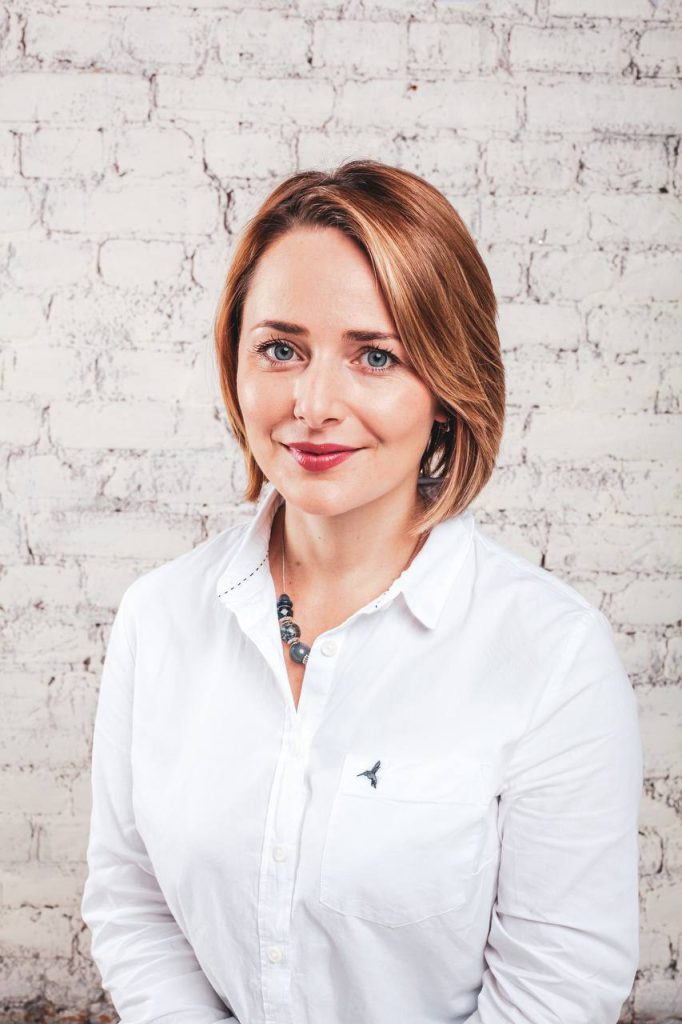
Oleksandra Balyasna
Head of the Association of Parents of Prematurely Born Children ‚Ranni ptashky‘ (the Ukrainian for ‚early birds‘ – translator’s note)
Head of the Association of Parents of Prematurely Born Children ‚Ranni ptashky‘ (the Ukrainian for ‚early birds‘ – translator’s note), Oleksandra Balyasna, says that the number of requests for help from particular people has increased. ‚We try to mainly deal with advocacy and education, bringing members of the community together. However, one can feel that the situation of parents throughout Ukraine has deteriorated. People have lost their income or home, with husbands serving in the Armed Forces of Ukraine, not being able to help their wives.’ Parents are offered one-time financial or humanitarian aid. Also, requests sent by doctors are also covered’.
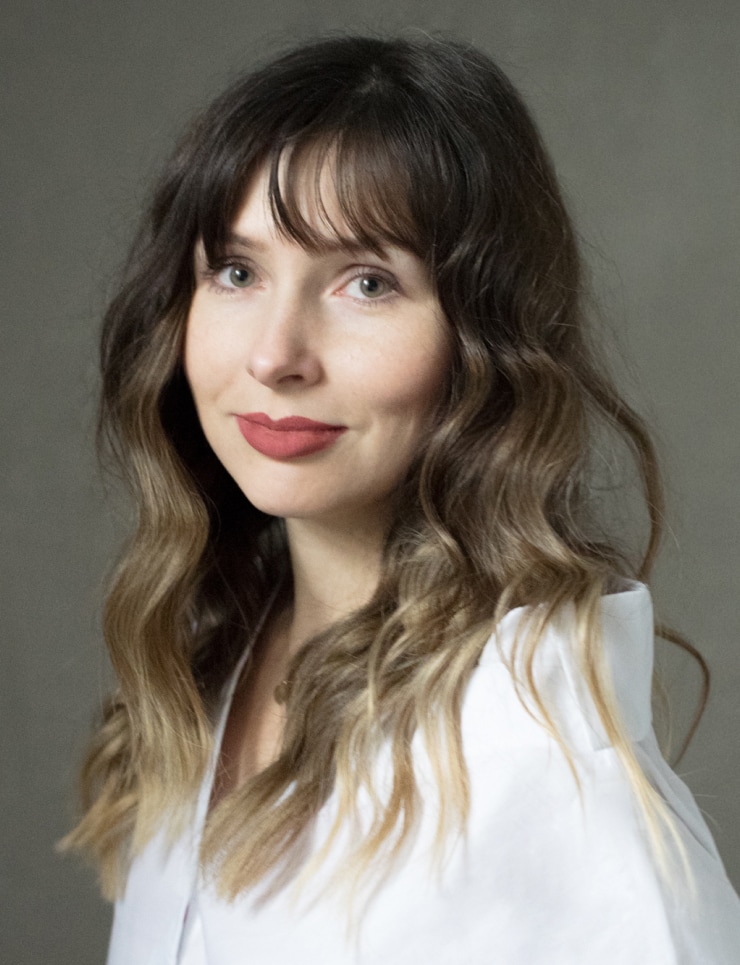
Yuliya Ridchenko
Strategic director of the
foundation “280 days”
The charitable foundation ‚280 Days‘ has had the same experience. Its strategic director, Yuliya Ridchenko, says that before the war her work was mainly focused on education to help women prevent complications during their pregnancy. After February 24 she and her colleagues came to realize that the focus should be shifted. ‚The stress level has gone up and each family requires individual help‘. Currently the foundation is working in two fields, procurement of equipment for health care facilities and targeted help for pregnant women. They receive super boxes, i.e., things that would-be mothers may require in the delivery ward or their children may need during the first month of their life.
Our interlocutors maintain that at the government level the amount of funds has not tapered off. Neonatology services and care of newborns are covered by the national service packages. The National Health Service of Ukraine and the Ministry of Healthcare take good systematic care of providing equipment, medicines and other procurement work. This means that parents at a hospital will not need to pay a single cent out of their pockets, something that seemed almost unthinkable in recent years.
In reality problems do occur: for instance, necessary medicines may not receive certification on time or there are only five baby formulas in the entire country, while newborns need them right here, right now.
Apart from that, rehabilitation may take years, in which case one would have to spend hundreds of thousands hryvnia. Public organizations and volunteers help solve these problems. They know whom they should go to in these cases.
‚We receive lots of requests from parents and doctors’, says head of ‚Ranni Ptashky’, Oleksandra Balyasna. Recently we covered the need for vein scanners. A good scanner costs over 100 thousand UAH (about 2,5 thousand USD – translator’s note). We cannot purchase it without donors’ help. With partners’ support we also bought an encephalography device with neonatal indicators worth over half a million UAH (about 12,5 thousand USD – translator’s note). One can get along without these devices, but they do help cater to the needs of newborns. Being part of the patient community, we want every child to get the best possible start into their lives.
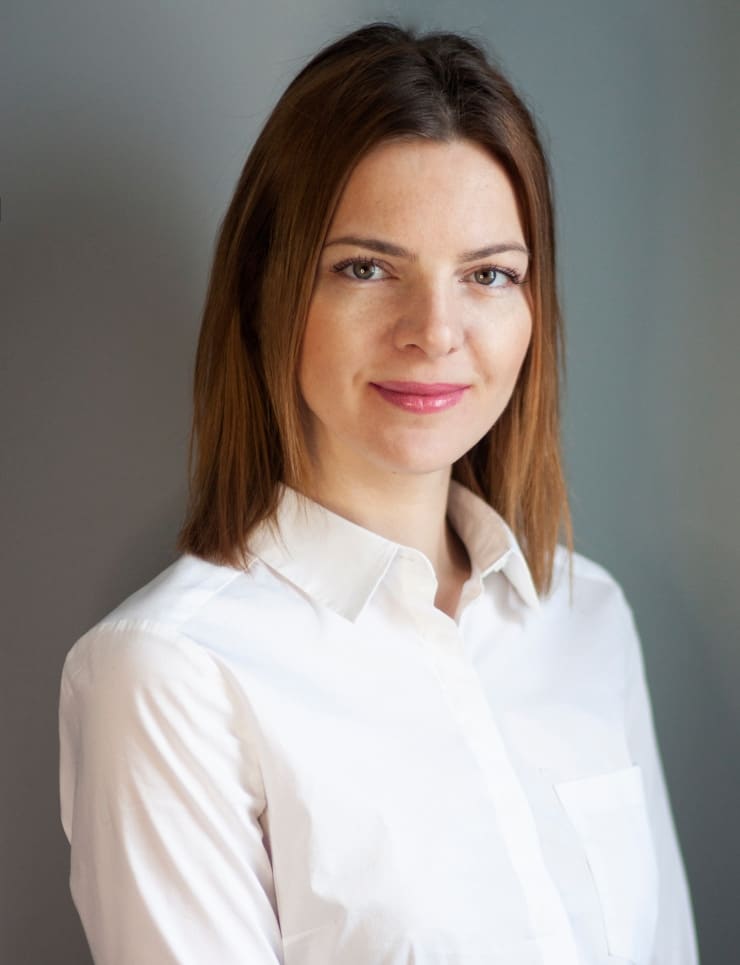
Alesya Azarova
Founder of the foundation
“280 days”
Founders of the foundation ‚280 days’ explain to us why they have begun purchasing equipment. ‚We are not able to prevent many complications during pregnancy. If a baby is born, the hospital that nurses them has to have necessary equipment‘. The founder of the foundation, Alesya Azarova, says that requests received from neonatal departments are usually standard, namely, intensive care stands, bill lights, heat lamps, portable incubators, oxygen tanks, sensors, pulse oximeters, oxygen tubes.
Both Alesya and Oleksandra (founders of ‚280‘ and ‚Ranni Ptashky‘ respectively) have given premature birth to their babies. They were forced to experience a lack of information on the subjects, which is why they are aware of the situation in its many manifestations. They are willing to help other parents.
Winter is coming
Provision of babies with heat will become a major priority in the wintertime. It was always difficult to respond to this challenge in peaceful times, let alone now.
‚Ranni Ptashky’ are working on a separate project within the framework of which they were planning to purchase heating tables and lamps for phototherapy.
It is of crucial importance that a newborn does not lose a single gram of heat even during power outages.
‚Winterization‘, or, in other words, preparation for the winter time, is relevant for everyone. The foundation ‚280 days‘ receives requests for boilers, radiators, mattress warmers (which are perfectly portable and can support the newborn’s body temperature for several hours even during power outages) for newborns, rather than for specialized equipment.
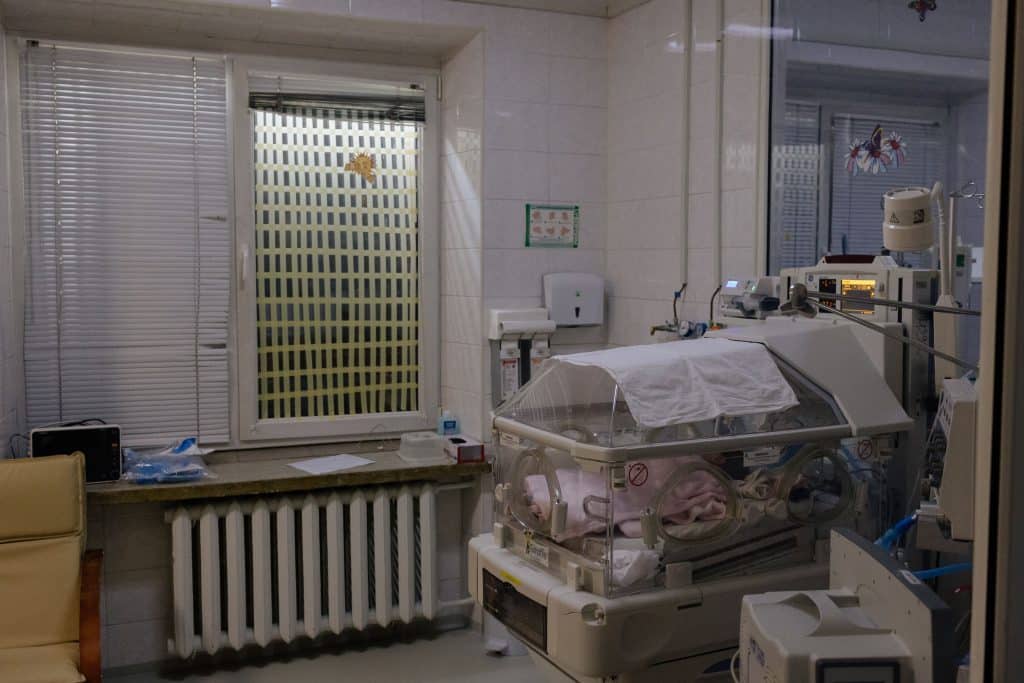
However, the crisis has not only struck Ukraine. Other countries are also experiencing problems with fuel and power. Oleksandra Balyasna says that in Switzerland volunteers are raising funds to cover the expenses for transportation of children to intensive care units since hospitals there are not able to do that on their own. Whereas before, on World Prematurity Day, which is celebrated on November 17, famous buildings throughout the world were illuminated in purple, this year a decision has been made to save electricity. Thus we can only take a look at the pictures taken from previous years, reminiscing about those times.
According to the staff of both ‚Ranni Ptashky’ and ‚280 days’, at the beginning of the full-scale invasion of Ukraine the were more people willing to help, both as members of companies and as individuals. Everything was chaotically organized since people were trying to deal with everything at once. Work now has taken on a more systematic dimension. It is true that people have ceased to donate as much as they used to because everyone has run out of money. However, it is now possible to foster cooperation with businesses and search for grants. ‚There is a significant decline in quick money, however, we are seeing many grant opportunities offered by large organizations. They need time to assess the situation, prepare programs, work out and adopt priority policies’, says Alesya Azarova and Yuliya Ridchenko from the foundation ‚280 days‘. ‚Grants offered by the European Union, embassies, as well as quick response grants open up an opportunity to cover our considerable infrastructural needs by our organizations‘.
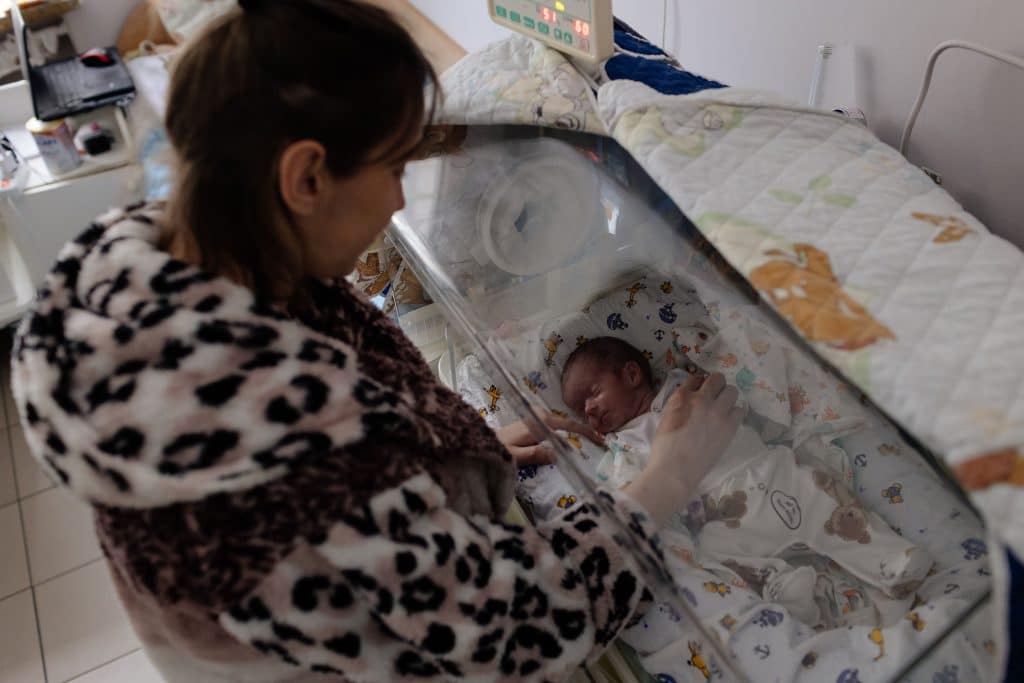
Oleksandra Balyasna from ‚Ranni Ptashky’ shares this opinion. ‚Should donors get weary, other systematic approaches and programs pop up, while the capacity of organizations is enhancing. As of the beginning of the full-fledged invasion we did not have experience working with humanitarian aid. However, we have gained a new experience, having also opened a new dialogue on our part’.
Our reply to the request of organizations saying ‚We want to help‘ would be ‚How exactly? What kind of report would you like to receive? What results do you expect and in which area? Are you ready to prepare a package of documents for us so that everything is transparent?’.
This is how effective work schemes are being established.
Being aware of concrete needs faced by doctors, public organizations contact big donors or other organizations of a certain profile. For example, ‚Doctors without Borders‘ covers a parenteral nutrition request. There is no longer buzz around aid being delivered to Ukraine, which means it is now possible to plan work and build long-lasting relationships with those who are really ready to help.
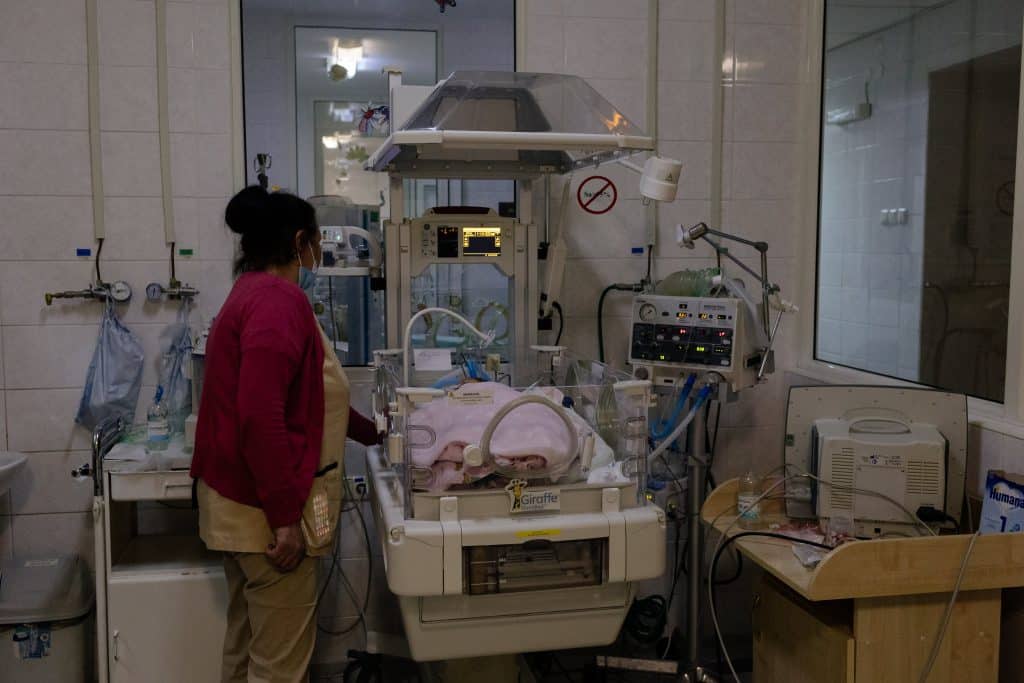
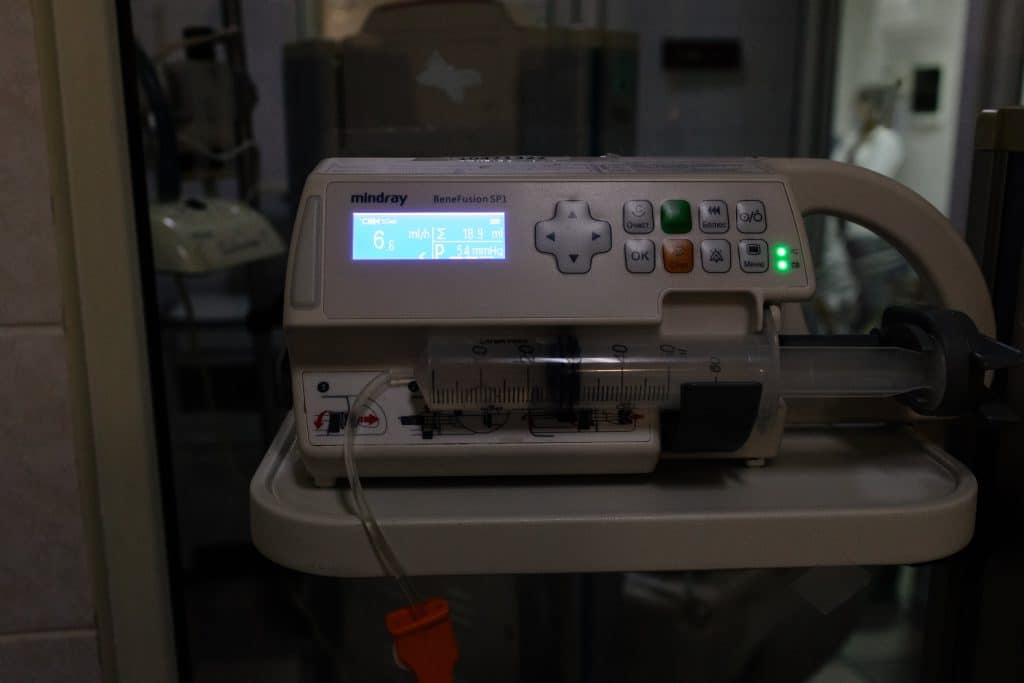
How to control the uncontrollable
Premature birth is a process that can hardly be predicted or prevented. To avoid stress during war and calm oneself down while being in the region that is subjected to shelling 20 hours a day is effectively impossible. The neonatologist, Anastasiya Stefanyshyn, recommends going through perinatal screening before the due date as well as staying in touch with doctors if possible. Should they spot the risk, they would at least do the procedure of complication prevention. Trusting relationships with a doctor are especially important so as not to be afraid of asking questions and doing away with the unknown, which is plentiful in our times. Should you feel that the doctor does not meet your needs and you have the opportunity to contact another one, you are advised to do that at once.
Every little thing is important – pack a ‚delivery bag‘ that would include all necessary things. In doing so you would not feel stressed about documents you might forget or seek support in groups for parents. You can take an emotionally important thing for you to the hospital. During the stage of nursing a newborn in the intensive care unit, the staff of the Ivano-Frankivsk Oblast Children’s Hospital practice the so-called ‚bonding squares’: cotton squares tied on a hook that would-be mothers carry around them to leave them later to their baby. Mother’s scent positively impacts on the nervous and cardiovascular system of her baby, whereas the scent of the latter calms mother and reduces the risk of postnatal depression.
A similar effect is produced by the ‚kangaroo method‘ promoted by ‚Ranni Ptashky‘ in Ukraine. This method is about the ‚skin-to-skin‘ approach between the baby and one of the parents, who put their baby to their chest and keep holding them as long as they want. Thus the baby hears and feels their heartbeat, breathing rhythm, warmth and scent. The research has shown that prematurely born babies are less susceptible to illnesses after being nursed by the ‚kangaroo method‘ compared to those nursed in incubators.
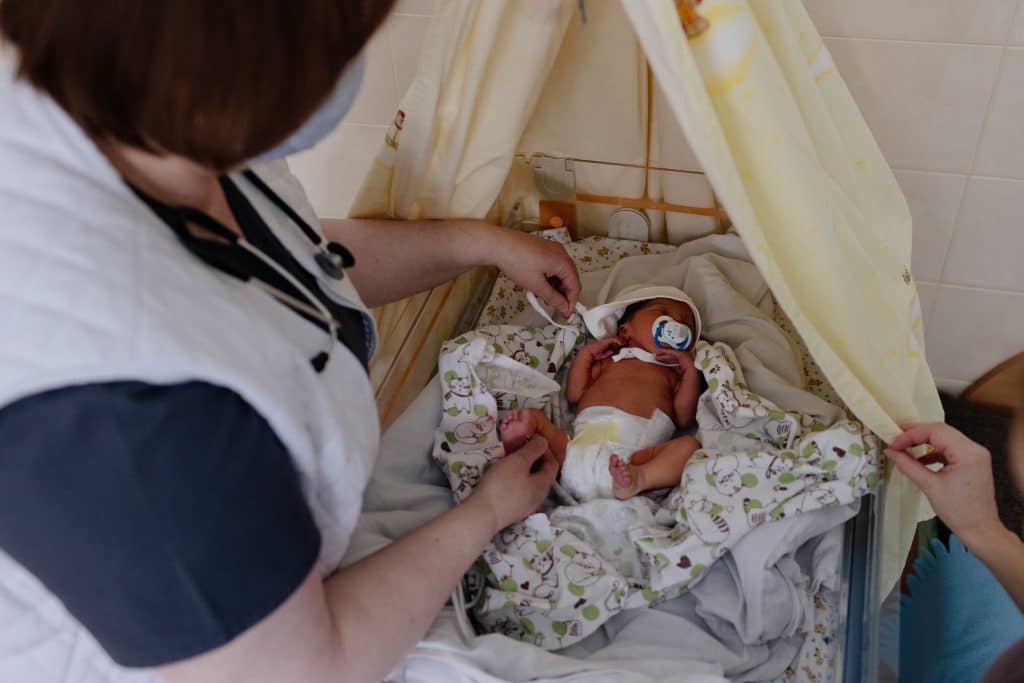
‚We tend to underestimate just how much should be done in terms of psychological support‘, says Oleksandra Balyasna. ‚Ranni Ptashky‘ has set up a chatroom for parents where they can help one another by advising or offering practical help. In different cities also in-person sessions are held for mothers who come to show pictures of their already grown children. This gives strength for other parents of ‚prematures‘. Such sessions are also visited by therapists. On Viber a hotline for these people is also available.
Last year ‚Ranni Ptashky‘ organized such sessions timed with World Prematurity Day. The subject matter of the session was the ‚kangaroo method‘. The Kharkiv Regional Perinatal Center invited its former patients despite the challenging security situation in the city.
After February 24 all those involved in the field have developed their inner understanding of the value of their work.
Doctors, parents and volunteers share the conviction that Ukrainian medicine can be on a par with that of the world’s leading countries. They hope that the war will give an incentive for improvements. Despite all the vicissitudes of war, all participants of the process are trying to seize the opportunities that open up for them to the fullest. ‚If we continue looking ahead and stop thinking of Ukraine as a third-world country, we stand a real chance of reaching quite a high level‘, says Anastasiya Stefanyshyn.

